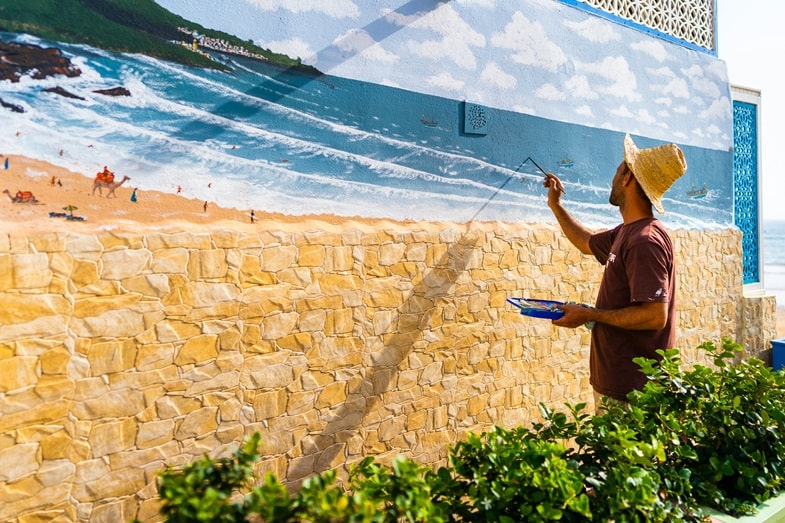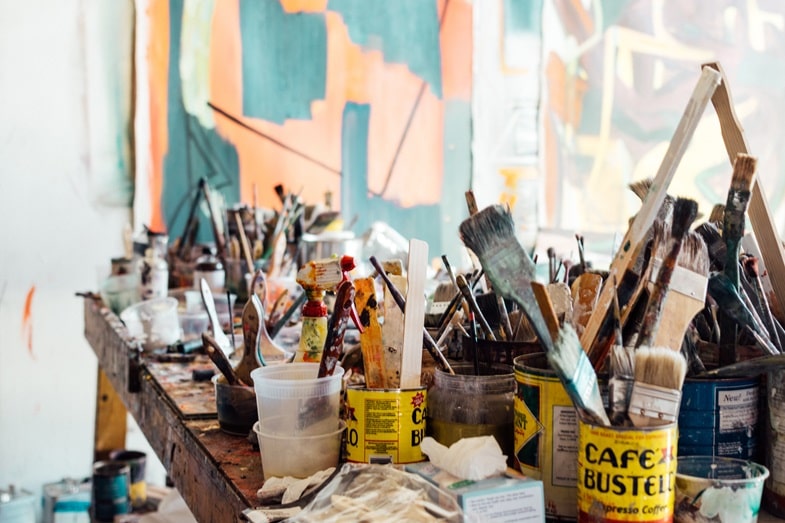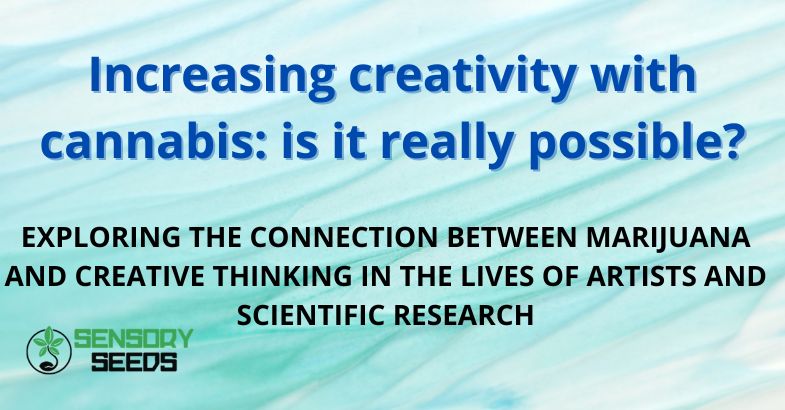Published on: 06/01/2024
EXPLORING THE CONNECTION BETWEEN MARIJUANA AND CREATIVE THINKING IN THE LIVES OF ARTISTS AND SCIENTIFIC RESEARCH
Does cannabis really increase creativity?
This question has tickled the minds of artists, researchers and the curious for decades. From the Beat Generation of the 1950s, with iconic writers like Jack Kerouac and Allen Ginsberg, to the rock stars of the 1970s like Jimi Hendrix and Janis Joplin, many have explored the potential of cannabis (and so of weed seeds) as a catalyst for revolutionary ideas and artistic expression.
But, while anecdotes abound and tales of transcendental experiences multiply, what does science really say? Is the connection between cannabis and creativity a fact, a suggestion, or perhaps a combination of the two?
In the following article we will try to analyze this topic by separating myth from reality .
Short disclaimer
The topic in question, i.e. the analysis of the link between cannabis consumption and creativity, will be treated for purely informative purposes , examining the declarations of artists who have used this substance during their career and the opinion of the research in this regard .
Net of these aspects, we remind readers that in the UK the marijuana is considered an illegal substance and that, therefore, its production, sale and consumption are always considered illicit , in any situation.
In the universe of cannabis, the exceptions are therapeutic products approved by AIFA, those based on CBD and marijuana seeds , the latter being legal if purchased for collecting purposes as they do not contain THC , the psychoactive compound responsible for the narcotic effects of the plant.
The use of cannabis in the world of artists
Throughout history, cannabis has found a prominent place in the testimonies of numerous artists, writers and musicians .
Bob Marley once stated, “When you smoke weed, it reveals you.” This self-revelation, for many, represented a deep dive into the recesses of their own creativity.
From jazz to rock, through literature and the visual arts, the list of those who have found inspiration in cannabis is long and varied. Billie Holiday, jazz legend, and Hunter S. Thompson, pioneer of gonzo journalism, are just a few of the many who have openly acknowledged the role of this substance in their creativity. These artists often depicted cannabis as a key to otherwise inaccessible moods and ideas , a means to cross mental barriers and discover new frontiers of the imagination.


Jim Morrison , rock icon, saw marijuana as a bridge between everyday reality and a broader universe of sensations and inspirations. Similar sentiments have been expressed by many visual artists who have found in cannabis a tool to explore new palettes of colors and shapes, taking their art in previously unexplored directions.
However, it is crucial to recognize that for every positive testimonial, there may be just as many voices claiming to have found no creative benefit in using cannabis derived by feminized cannabis seeds. In fact, some creatives have reported a decrease in concentration or a feeling of apathy, making artistic production more difficult.
The debate becomes even more complex when you consider that the perception of the effects of cannabis can vary enormously from individual to individual .
And then there is the dilemma: are these effects directly attributable to cannabis or are they influenced by external factors, such as environment, mood or personal expectations? Or could it be that cannabis works as an amplifier, intensifying what already exists in the individual’s psyche, whether it be a creative impulse or a mental block?
Read also: Cannabis seed germination guide
Creativity and cannabis: a look at the effects on the nervous system and the research on the subject
In a world where personal opinions can easily obscure the facts, turning to science offers a compass to navigate the debate about cannabis and creativity. But, as with many complex questions, research doesn’t always offer definitive answers .
Effects of cannabis on the brain
At the neurological level, cannabis acts primarily on the CB1 and CB2 receptors of the endocannabinoid system . This interaction can influence several cognitive processes, including memory, concentration and, of course, creativity.
Some studies also suggest that cannabis may increase blood flow to the frontal lobe , a region of the brain associated with planning, motivation and, in particular, creativity.
Research results
Despite what was said in the previous paragraph, it must be admitted that research on the topic has not yet highlighted results capable of offering a decisive answer .
Some studies indicate that cannabis can improve certain aspects of creativity, such as divergent thinking (the ability to think of outside-the-box solutions to overcome a problem). At the same time, however, it would seem that it inhibits the potential of convergent thinking, i.e. the ability to find the solution to a problem by reasoning logically and based on one’s wealth of experiences.
Importantly, many of these studies vary in methodology, population samples, and dosages of THC and CBD, the main psychoactive compounds in cannabis derived for example from autoflowering seeds. These variables can greatly influence the results , making it difficult to draw concrete conclusions.
In short, while science has made progress in understanding the effects of cannabis on the human psyche, the question of its direct influence on creativity remains, in part, a mystery. What is certain is that this relationship is not linear and can vary from individual to individual .
Differences in the effects of cannabis based on strain and terpene content
While the debate about cannabis and creativity plays out on a broad front, it’s critical to take an often overlooked aspect into consideration: not all marijuana strains are created equal .
Cannabis plants can generally be divided into two main categories: Indica and Sativa . This classification, originating from botanical differences, is the basis of the different experiences reported by users.
Sativa strains are often described as providing lively, rejuvenating energy. The effects they produce tend to be more ‘cerebral’, often giving a feeling of euphoria. Many artists and thinkers believe that these effects can facilitate the flow of ideas and stimulate the mind in ways that foster creativity, making such strains popular among those seeking inspiration.
On the other hand, Indica strains are often associated with a deep sense of relaxation and calm. The effects tend to be more body-centered, promoting muscle relaxation and stress reduction. While these strains may offer a refuge from the daily chaos, they may not be the ideal choice for those looking for a creative boost.
Another fundamental aspect is the terpene content of cannabis . These aromatic compounds, present in many other plants, in fact, play a crucial role in the user experience.
Compounds like limonene and pinene are known for their energizing properties . The presence of these terpenes in certain cannabis strains can enhance the feeling of vigor and mental stimulation. Other terpenes can have opposite effects, contributing to the experience of calm and relaxation.


The main criticisms against consuming cannabis to increase creativity
The claim that cannabis can affect creativity is, of course, not without criticism .
Some scholars argue that this substance, rather than actually amplifying creativity, could only create an illusion of greater productivity. In short, a mirage that clashes with the harsh reality, that is, the fact that work performed under the influence of cannabis, in reality, often does not live up to an individual’s expectations or usual quality .
Another aspect to consider is the relationship between cannabis and motivation .
Although the so-called ‘amotivational syndrome’ is not universally accepted by the scientific community, there are certainly testimonies of individuals who claim to have experienced a loss of interest following regular cannabis use .
Furthermore, several studies have documented the potential side effects associated with cannabis use . The substance has been linked to a potential reduction in short-term memory and also to mental health disorders: in particular, while some people can use cannabis without apparent problems, others may experience symptoms such as anxiety, paranoia or even psychotic episodes.
The importance of this aspect cannot be underestimated, especially in relation to individuals who have a history of mental health problems or a genetic predisposition.
Read also: Cannabis for personal use: everything you need to know in 2023
In conclusion
The relationship between cannabis and creativity is a complex topic, full of facets and nuances. If on the one hand there are testimonies and anecdotal stories that paint cannabis as a key to access new creative depths , on the other hand there is scientific and critical research that suggests a more cautious picture.
While some individuals find inspiration and renewed creative energy through the use of cannabis, others may not experience the same benefits, or worse, may be faced with unwanted side effects. This discrepancy highlights the importance of individuality in the experience with cannabis and creativity .
We hope we have satisfied your curiosity regarding this much discussed and controversial topic. Before saying goodbye, we suggest you take a look at our Sensoryseeds online shop : here you will find many varieties of collectible marijuana seeds, of the highest quality, perfect for enthusiasts of the world of cannabis!
💡TAKEAWAYS ON THE LINK BETWEEN CANNABIS AND CREATIVITY
- The connection between cannabis use and creativity is a topic debated by artists, researchers and onlookers. Many artists, from musicians to writers, have explored cannabis’ potential as a catalyst for revolutionary ideas and artistic expression.
- Despite anecdotes and testimonies of positive experiences, science still does not offer definitive answers on the relationship between cannabis and creativity. The effects of cannabis on the brain vary from individual to individual and can be influenced by multiple external factors.
- The effects of cannabis on the nervous system are complex and can influence cognitive processes such as memory, concentration and creativity. Some studies suggest that cannabis may improve divergent thinking, but may inhibit convergent thinking.
- Cannabis strains, such as Indica and Sativa, can have different effects on creativity. Sativa strains are often associated with lively energy and can stimulate the flow of ideas, while Indica strains promote relaxation and calm.
- The use of cannabis to enhance creativity is subject to criticism. Some scholars believe it can create an illusion of greater productivity, and there are concerns about motivation and side effects on memory and mental health.
FAQ ON THE LINK BETWEEN CANNABIS AND CREATIVITY
What does science say about the connection between cannabis and creativity?
Science has not yet provided a definitive answer on the connection between cannabis and creativity. Many artists have reported positive effects, but research is inconclusive.
What are the effects of cannabis on the brain?
Cannabis acts on the CB1 and CB2 receptors of the endocannabinoid system, influencing memory, concentration and potentially even creativity.
What are the criticisms against using cannabis to enhance creativity?
Some critics argue that cannabis use may illusory increased productivity rather than actually increase creativity. Additionally, concerns have been raised regarding motivation and mental health side effects.









